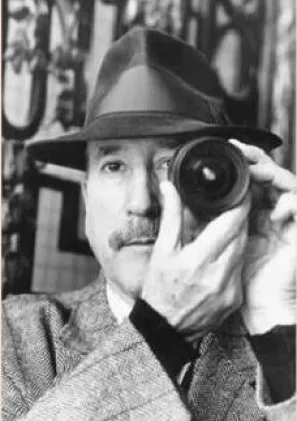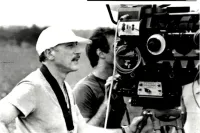Biography
1930 - 1992
“I believe that what is functional is beautiful, that functional light is beautiful light. I try to make sure that my light is logical rather than aesthetic."
- Nestor Almedros
Born in Barcelona, Néstor Almendros moved to Cuba at 18 to join his exiled anti-Franco father before eventually heading to Rome to study filmmaking. Upon his return he directed 6 film shorts in Cuba and 2 in New York. When two of his shorts were banned in Cuba he moved to Paris where he became a favorite cinematographer of Eric Rohmer (‘Claire’s Knee’) and Francois Truffault (‘The Wild Child’, ‘The Last Metro’). He began his Hollywood career by winning an Oscar for his stunning shots of endless wheat fields and naked sky in Terrence Malick’s ‘Days of Heaven’ (1978) – still considered by many to be one of the most gorgeous films ever made. He followed this with high profile projects like ‘Kramer vs. Kramer’, ‘Sophie’s Choice’ and ‘Places in the Heart’. In 1984 he returned to Cuba and co-directed ‘Mauvaise Conduite’ (‘Improper Conduct’) an intense indictment of human rights violations and the persecution of sexual dissidents in the country, including homosexuals. In 1987 he made a second documentary about Cuba, ‘Nadie Escuchaba’ (‘Nobody Listened’) about dissidents who fled the country after doing time in Cuban prisons. Discussing his documentaries Almendros said, “I’ve made 47 films and I’ve got several awards, and there’s a moment when you think you owe something to society. I have access to camera and film, and I know how. The Cuban case is too scandalous not to think about.” Throughout his career Nestor Almendros used his camera to open minds as well as eyes. An intensely private gay man regarding his personal life, Almendros died of complications from AIDS-related lymphoma in New York at the age of 61.
1930 - 1992
“I believe that what is functional is beautiful, that functional light is beautiful light. I try to make sure that my light is logical rather than aesthetic."
- Nestor Almedros
Born in Barcelona, Néstor Almendros moved to Cuba at 18 to join his exiled anti-Franco father before eventually heading to Rome to study filmmaking. Upon his return he directed 6 film shorts in Cuba and 2 in New York. When two of his shorts were banned in Cuba he moved to Paris where he became a favorite cinematographer of Eric Rohmer (‘Claire’s Knee’) and Francois Truffault (‘The Wild Child’, ‘The Last Metro’). He began his Hollywood career by winning an Oscar for his stunning shots of endless wheat fields and naked sky in Terrence Malick’s ‘Days of Heaven’ (1978) – still considered by many to be one of the most gorgeous films ever made. He followed this with high profile projects like ‘Kramer vs. Kramer’, ‘Sophie’s Choice’ and ‘Places in the Heart’. In 1984 he returned to Cuba and co-directed ‘Mauvaise Conduite’ (‘Improper Conduct’) an intense indictment of human rights violations and the persecution of sexual dissidents in the country, including homosexuals. In 1987 he made a second documentary about Cuba, ‘Nadie Escuchaba’ (‘Nobody Listened’) about dissidents who fled the country after doing time in Cuban prisons. Discussing his documentaries Almendros said, “I’ve made 47 films and I’ve got several awards, and there’s a moment when you think you owe something to society. I have access to camera and film, and I know how. The Cuban case is too scandalous not to think about.” Throughout his career Nestor Almendros used his camera to open minds as well as eyes. An intensely private gay man regarding his personal life, Almendros died of complications from AIDS-related lymphoma in New York at the age of 61.
Demography
Demography
Gender Male
Sexual Orientation Gay
Gender Identity Cisgender
Ethnicity Latinx
Nations Affiliated Spain Cuba United States Italy
Era/Epoch AIDS Era (1980-present) Information Age (1970-present)
Field(s) of Contribution
Film
Commemorations & Honors
Human Rights Watch International Film Festival Annual Award- Nestor Almendros Award for Courage in Filmmaking
Academy Award Best Cinematography for Days of Heaven (1978)
César Award Best Cinematography for François Truffaut's The Last Metro (1980)
International Documentary Association Winner for Nadie Escuchaba (1988)
Demography
Gender Male
Sexual Orientation Gay
Gender Identity Cisgender
Ethnicity Latinx
Nations Affiliated Spain Cuba United States Italy
Era/Epoch AIDS Era (1980-present) Information Age (1970-present)
Field(s) of Contribution
Film
Commemorations & Honors
Human Rights Watch International Film Festival Annual Award- Nestor Almendros Award for Courage in Filmmaking
Academy Award Best Cinematography for Days of Heaven (1978)
César Award Best Cinematography for François Truffaut's The Last Metro (1980)
International Documentary Association Winner for Nadie Escuchaba (1988)
Resources
Resources
Bailey, John. "Memories of Almendros." American Cinematographer 80.8 (August 1999): 120-122.
Honan, William H. "Nestor Almendros, Cinematographer, Dies at 61." New York Times (March 5, 1992): B15.
Mira, Alberto. "Almendros, Néstor." Who's Who in Contemporary Gay and Lesbian History. Robert Aldrich and Garry Wotherspoon, eds. London: Routledge, 2001. 12.
Smith, Paul Julian. Vision Machines: Cinema, Literature, and Sexuality in Spain and Cuba, 1983-1993. London: Verso, 1996.
https://en.wikipedia.org/wiki/N%C3%A9stor_Almendros
http://gayinfluence.blogspot.com/2012/10/nestor-almendros.html
https://www.filmcomment.com/article/interview-nestor-almendros/
https://www.chicagotribune.com/news/ct-xpm-1985-02-03-8501070183-story.html
Resources
Bailey, John. "Memories of Almendros." American Cinematographer 80.8 (August 1999): 120-122.
Honan, William H. "Nestor Almendros, Cinematographer, Dies at 61." New York Times (March 5, 1992): B15.
Mira, Alberto. "Almendros, Néstor." Who's Who in Contemporary Gay and Lesbian History. Robert Aldrich and Garry Wotherspoon, eds. London: Routledge, 2001. 12.
Smith, Paul Julian. Vision Machines: Cinema, Literature, and Sexuality in Spain and Cuba, 1983-1993. London: Verso, 1996.
https://en.wikipedia.org/wiki/N%C3%A9stor_Almendros
http://gayinfluence.blogspot.com/2012/10/nestor-almendros.html
https://www.filmcomment.com/article/interview-nestor-almendros/
https://www.chicagotribune.com/news/ct-xpm-1985-02-03-8501070183-story.html




